WordPress vs Drupal: Final verdict
WordPress and Drupal are both powerful open-source content management systems, but they cater to different user needs and expertise levels.
-
WordPress (Overall Grade: 7.1/10)
is known for its user-friendliness and extensive customization options through themes and plugins. It is ideal for beginners and those looking for an intuitive platform to build and manage websites. WordPress excels in ease of use, design functionalities, and a vast plugin ecosystem, making it suitable for blogs, business sites, and online stores. When comparing WordPress vs Drupal, WordPress stands out for its accessibility and broad appeal. -
Drupal (Overall Grade: 6.4/10)
offers unmatched flexibility and extensibility, making it a preferred choice for developers and users with advanced technical skills. It is well-suited for complex websites and applications that require custom functionalities. Drupal’s strengths lie in its robust security features, comprehensive user management, and powerful content management capabilities. In the WordPress vs Drupal comparison, Drupal is the go-to platform for creating highly customized and secure web solutions.

|

|
|
|---|---|---|
|
Design functionalities & templates |
9.0 |
7.8 |
|
Ease of use |
7.2 |
5.4 |
|
Ecommerce |
8.4 |
7.5 |
|
Website Editors |
8.5 |
7.5 |
|
Product testing options |
8.1 |
7.1 |
|
Price |
5.9 |
5.7 |
|
Website speed optimization |
6.5 |
6.4 |
|
Plugins/extensions and integrations |
8.8 |
8.6 |
|
Marketing features |
8.0 |
8.0 |
|
Customer support |
5.0 |
6.7 |
|
Website security |
6.7 |
8.3 |
|
AI capabilities |
6.1 |
7.5 |
|
User Management |
8.8 |
9.1 |
Which one is the best for ecommerce: WordPress or Drupal?
 8.4
8.4
 7.5
7.5
Verdict
: WordPress is a more user-friendly option for ecommerce, especially for those who prefer extensive plugin support and ease of use. Drupal, while powerful and flexible, is better suited for developers who need advanced customization and complex ecommerce solutions.
-
WordPress
: With its WooCommerce plugin, WordPress offers a comprehensive ecommerce solution that is easy to set up and manage. It supports multiple payment gateways, abandoned cart recovery, and a vast plugin ecosystem. This makes WordPress ideal for small to medium-sized online stores looking for a straightforward yet powerful ecommerce platform. -
Drupal
: Drupal Commerce provides a flexible and robust ecommerce solution, catering to complex pricing models and product variations. It offers extensive customization options through its modular architecture, making it suitable for large-scale and highly customized ecommerce sites. However, it requires more technical expertise compared to WordPress, making it a better fit for developers and larger businesses.
Which one is the best for informational and business websites?
 9.2
9.2
 7.5
7.5
Verdict
: When it comes to creating informational and business websites, WordPress stands out as the superior choice due to its ease of use, extensive customization options, and a higher score in this category. Drupal, while powerful and flexible, is better suited for users with advanced technical skills.
-
WordPress
: WordPress excels in creating informational and business websites with its user-friendly interface and extensive customization options. Scoring 9.2, it offers a wide array of themes and plugins that cater to various website needs, making it an ideal choice for beginners and those looking for a straightforward setup. The platform’s block-based editor and vast community support further enhance its appeal for creating and managing content-rich websites. -
Drupal
: Drupal, with a score of 7.5, is a robust and flexible CMS that is well-suited for complex and large-scale websites. It offers a high level of customization and scalability, making it a preferred choice for developers and organizations with specific requirements. However, its steep learning curve and advanced features may be overwhelming for beginners. Drupal’s extensive module library and strong security features make it a powerful tool for those who need a highly customizable and secure website.
WordPress vs Drupal: Detailed comparison
Design functionalities & templates
Design FunctionalitiesRepresents how well each platform allows for creative design and customization of websites.Score Components:
- Template Variety (30%): Range and quality of design templates.
- Customization (30%): Flexibility and options for design alterations.
- User Interface (20%): Ease and intuitiveness of the design process.
- Responsiveness (10%): Adaptability to different devices and screen sizes.
- Innovation (10%): Unique design features and tools.
 9.0
9.0
 7.8
7.8
🏆
Winner: WordPress.
If you’re looking for a platform that offers more creative control, a wide array of design features, and a higher Design Functionalities Templates score, WordPress is the preferred choice.
WordPress offers an extensive variety of templates and designs, catering to a wide range of website types beyond just blogs or ecommerce. Its open-source nature allows for high customization and creative freedom, appealing to diverse user needs. While WordPress itself doesn’t sell premium templates, numerous third-party theme shops offer sophisticated and specialized design choices, expanding the possibilities for users.
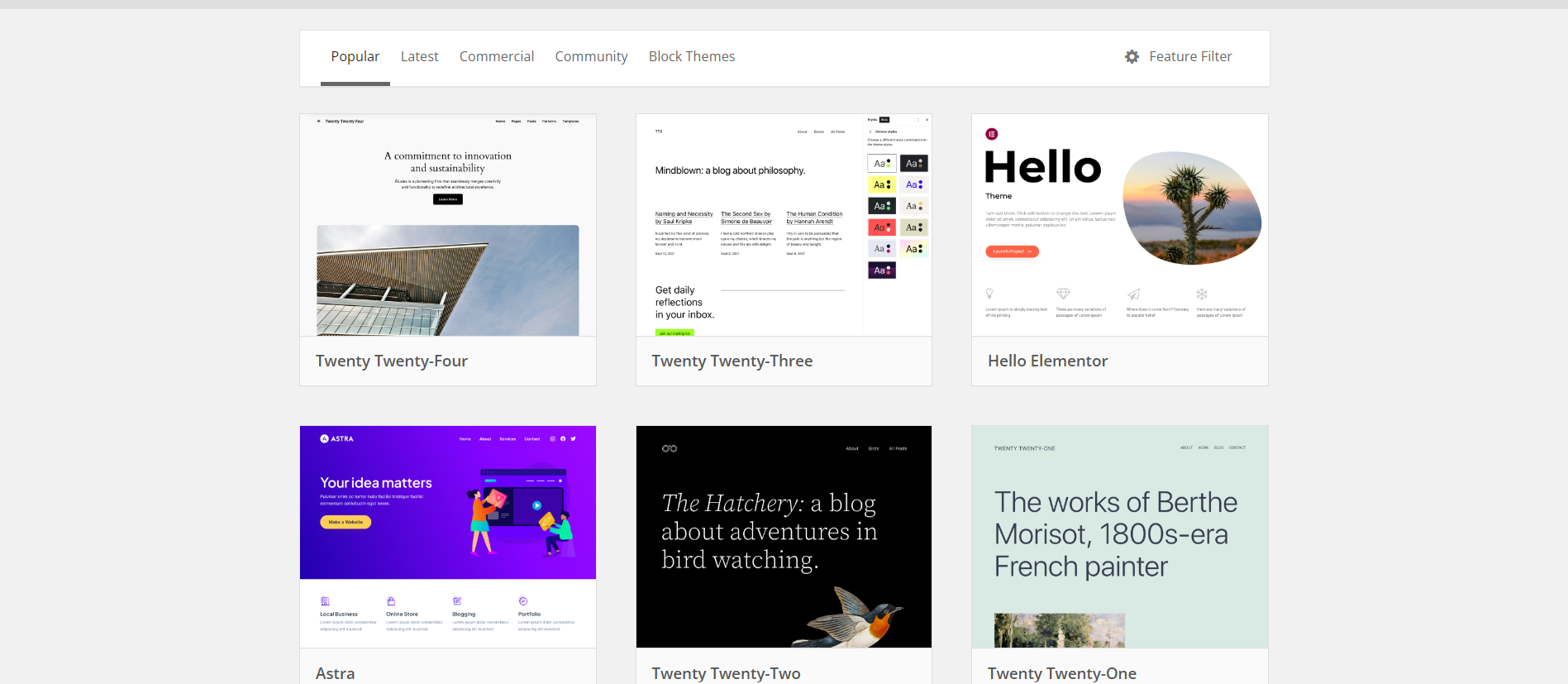

Compared to WordPress, Drupal, as a highly flexible and powerful content management system, offers a vast array of templates and designs to cater to virtually any website need. With thousands of themes available, users can choose from minimalist designs, industry-specific layouts, and highly customizable multipurpose themes. These templates are designed to be responsive, ensuring that websites look great on any device. Moreover, the Drupal community continuously contributes new designs and templates, expanding the options for users to keep their websites modern and engaging.
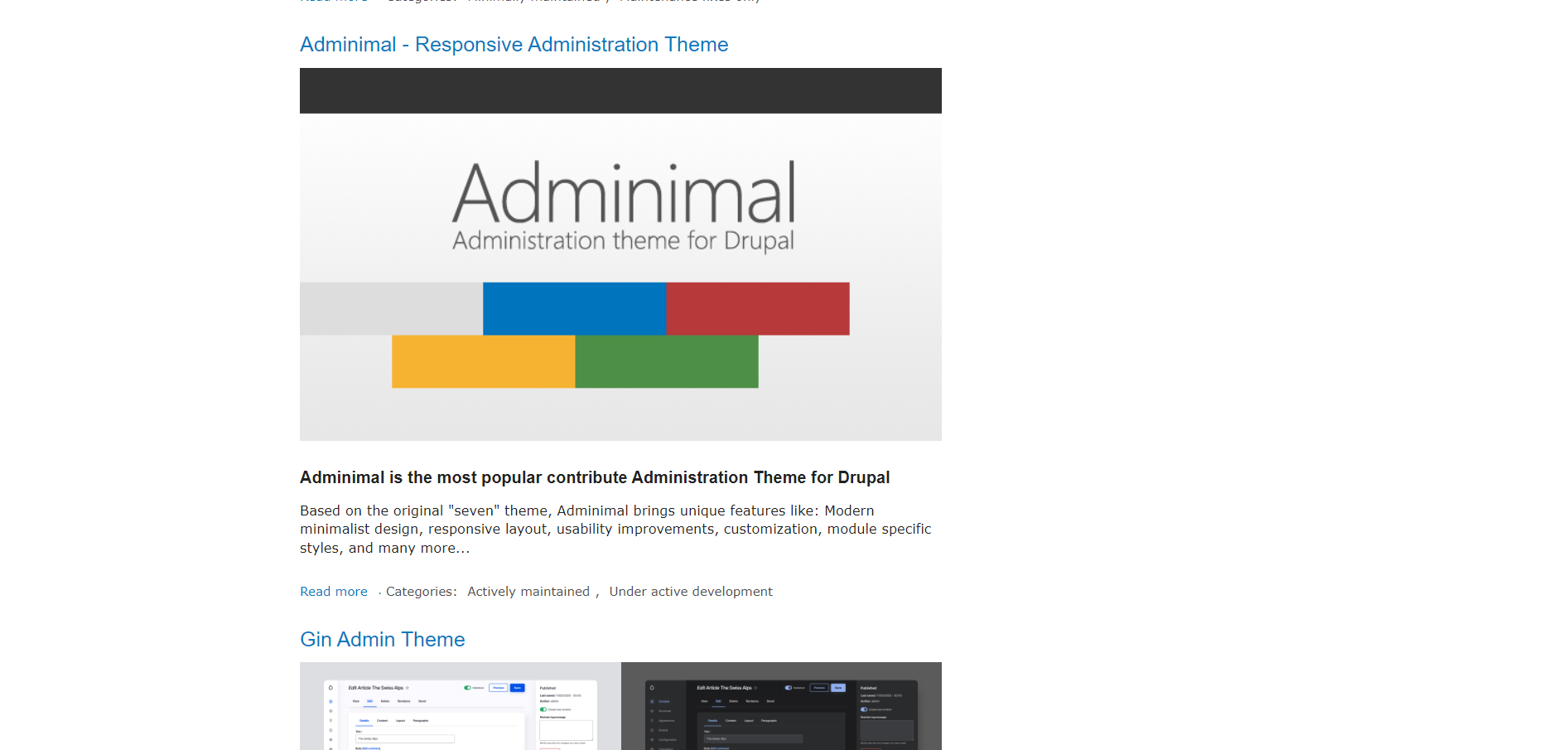
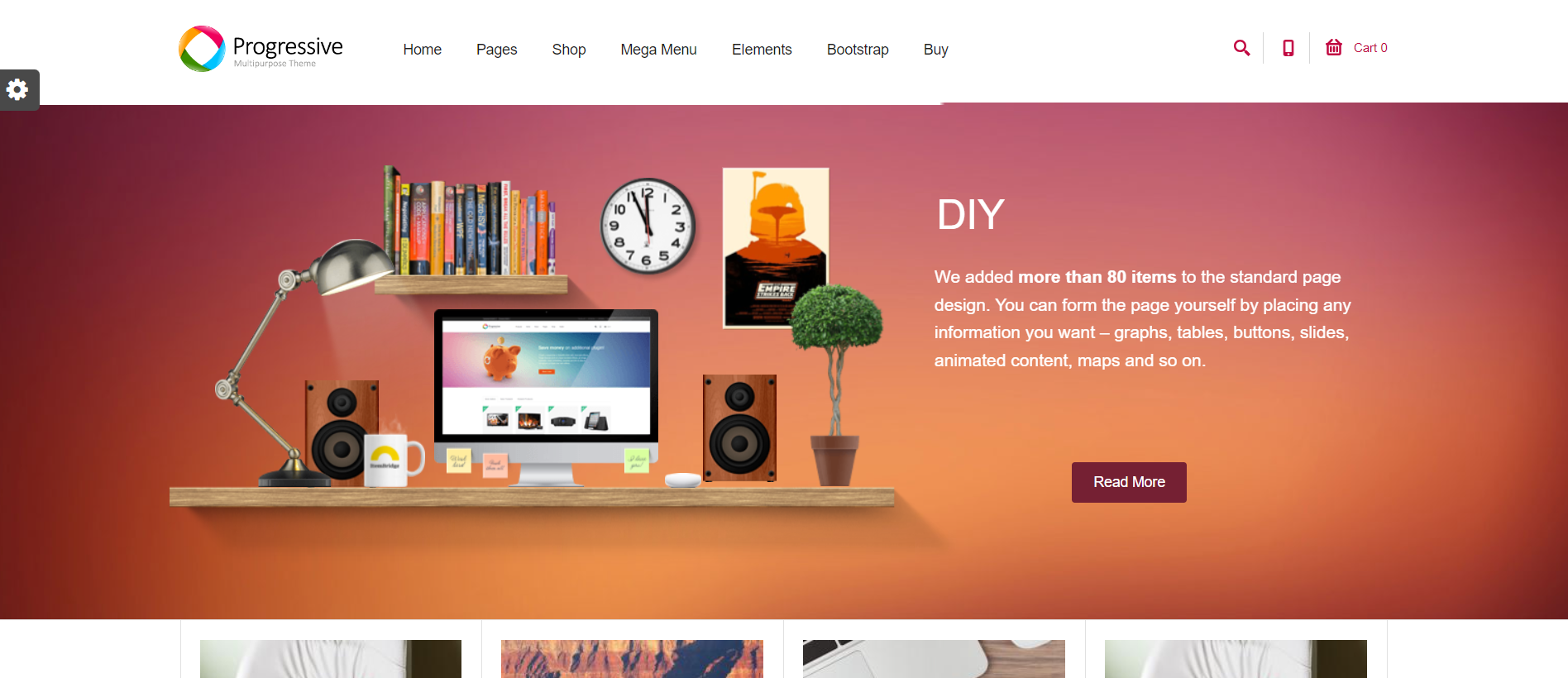
Get a head start on website creation with AI
Create a custom website tailored to your business needs 10X faster with 10Web AI Website Builder!
Ease of use
Ease of useReflects the platform’s overall user-friendliness.Score
Components:
- Learning curve (40%): Quickness and ease of getting started.
- Interface design (30%): Simplicity and intuitiveness of layout.
- User guidance (20%): Quality of tutorials and support.
- Flexibility (10%): Adaptability to various user skills.
 7.2
7.2
 5.4
5.4
🏆 Winner: WordPress
. Scoring 7.2, WordPress is generally easier to use than Drupal, which scores 5.4. While both platforms offer great flexibility and extensive customization options, WordPress is more intuitive and user-friendly, making it a better choice for beginners and those who desire full control over their website’s design and functionality.
Learning Resources
🏆 Winner: Tie
. Both WordPress and Drupal offer a wealth of learning resources, including extensive official documentation, vibrant community forums, and a variety of online courses and tutorials. These resources make both platforms accessible for beginners and beneficial for advanced users looking to deepen their expertise.
For ecommerce
EcommerceMeasures the platform’s effectiveness in supporting online business activities.Score Components:
- Ecommerce themes and templates (20%): Variety and design of templates.
- Product management (25%): Ease of managing and organizing products.
- Payment options (25%): Variety and convenience of payment methods.
- Ecommerce features (20%): Features for managing an ecommerce store.
- Integration (10%): Compatibility with external e-commerce tools and services.
 8.4
8.4
 7.5
7.5
When it comes to ecommerce, both WordPress and Drupal offer robust solutions. WordPress, with its WooCommerce plugin, provides a comprehensive ecommerce solution with features like multiple payment gateway support, abandoned cart recovery, and an extensive plugin ecosystem. Drupal, on the other hand, offers a flexible ecommerce solution with its Drupal Commerce module. It provides a wide array of features including shopping cart and checkout process, payment gateway integration, and customizable workflows that cater to complex pricing models and product variations.

|

|
|
|---|---|---|
|
Ecommerce themes and templates |
9.2 |
7.8 |
|
Product page customization |
9.0 |
8.3 |
|
Payment processing and commissions |
7.5 |
7.5 |
|
POS capabilities |
6.5 |
5.5 |
|
Payment gateways |
8.5 |
7.7 |
|
Product numbers |
7.0 |
7.0 |
|
Additional ecommerce features |
8.0 |
8.0 |
WordPress ecommerce features:
- WooCommerce Integration
- Multiple Payment Gateway Support
- Abandoned Cart Recovery
- Ecommerce Analytics
- SEO Optimization Tools
- Extensive Plugin Ecosystem
Drupal ecommerce features:
- Shopping Cart and Checkout Process
- Payment Gateway Integration
- Order Management and Invoicing
- Tax Calculation and VAT Support
- Shipping and Fulfillment
- Promotions and Discounts
- Reporting and Analytics
- Security and Compliance
Ecommerce themes & templates
WordPress offers hundreds to potentially thousands of ecommerce and WooCommerce specific themes and templates, both free and premium. Drupal, on the other hand, offers a wide array of eCommerce themes designed to cater to different types of online stores, from clean and simple designs to more sophisticated and feature-rich options. These themes are built with responsiveness in mind, ensuring that stores function seamlessly across various devices.
Product page customization
WooCommerce on WordPress offers extensive customization for eCommerce product pages, balancing plugins, page builders, and custom coding. Advanced features like product tabs, upsells, and related products are customizable. Drupal offers extensive customization possibilities for product pages through its modular architecture, allowing for detailed content types, flexible displays with Views, and theme customizations.
Payment processing
WordPress doesn’t handle payments directly but offers plugin options for payment processing. Popular gateways include PayPal, Stripe, Authorize.Net, and Square. Drupal supports a wide range of payment gateways through third-party modules, including popular ones like PayPal, Stripe, and Authorize.Net. These modules enable seamless integration for e-commerce functionalities on Drupal sites.
Website Editors
Website EditorsEvaluates the platforms’ website building and editing capabilities.Score Components:
- Customization tools (40%): Range and power of editing features.
- Editor usability (30%): User experience within the editor.
- Design flexibility (20%): Freedom in layout and design changes.
- Update and maintenance ease (10%): Simplicity of updating and maintaining the site.
 8.5
8.5
 7.5
7.5
🏆
Winner: WordPress
. WordPress, with a score of 8.5, offers a user-friendly interface with block-based editing, extensive styles customization, template management, page editing/creation, distraction-free modes, versatile saving options, and accessibility for users of varying skill levels. It provides a WYSIWYG (What You See Is What You Get) interface, with a Design panel on the left and a live preview on the right. Users can edit styles, manage templates and pages, and use various blocks for customization. Changes can be applied globally, including Header and Footer templates. The editor also offers features like undo/redo, List View, Command Palette, and customization tools.
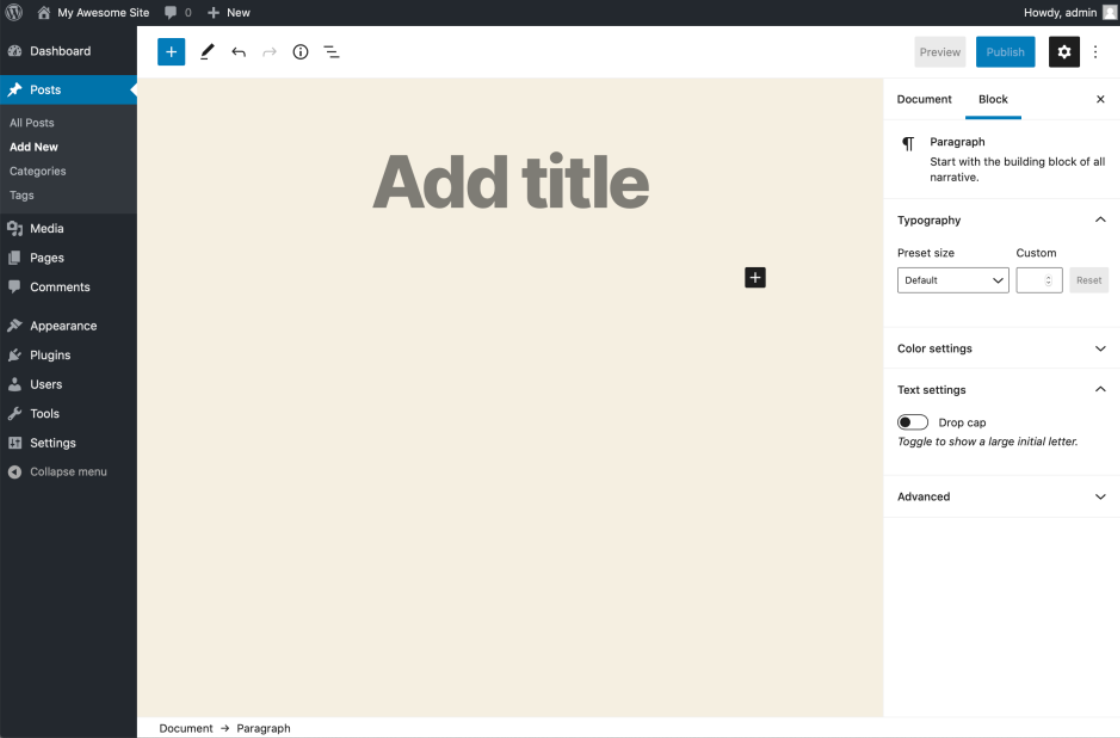
Drupal’s editor, scoring 7.5, offers a wide range of features tailored for content creation and management. It supports rich text editing, enabling users to format text, insert links, images, and media, as well as create tables and lists with ease. The editor is highly customizable, allowing administrators to configure toolbars and options according to the needs of their site. Furthermore, it integrates seamlessly with Drupal’s content management system, supporting features like automatic content saving, version control, and access control, making it a powerful tool for building and managing diverse web content. However, its steep learning curve can be a limitation for new users.
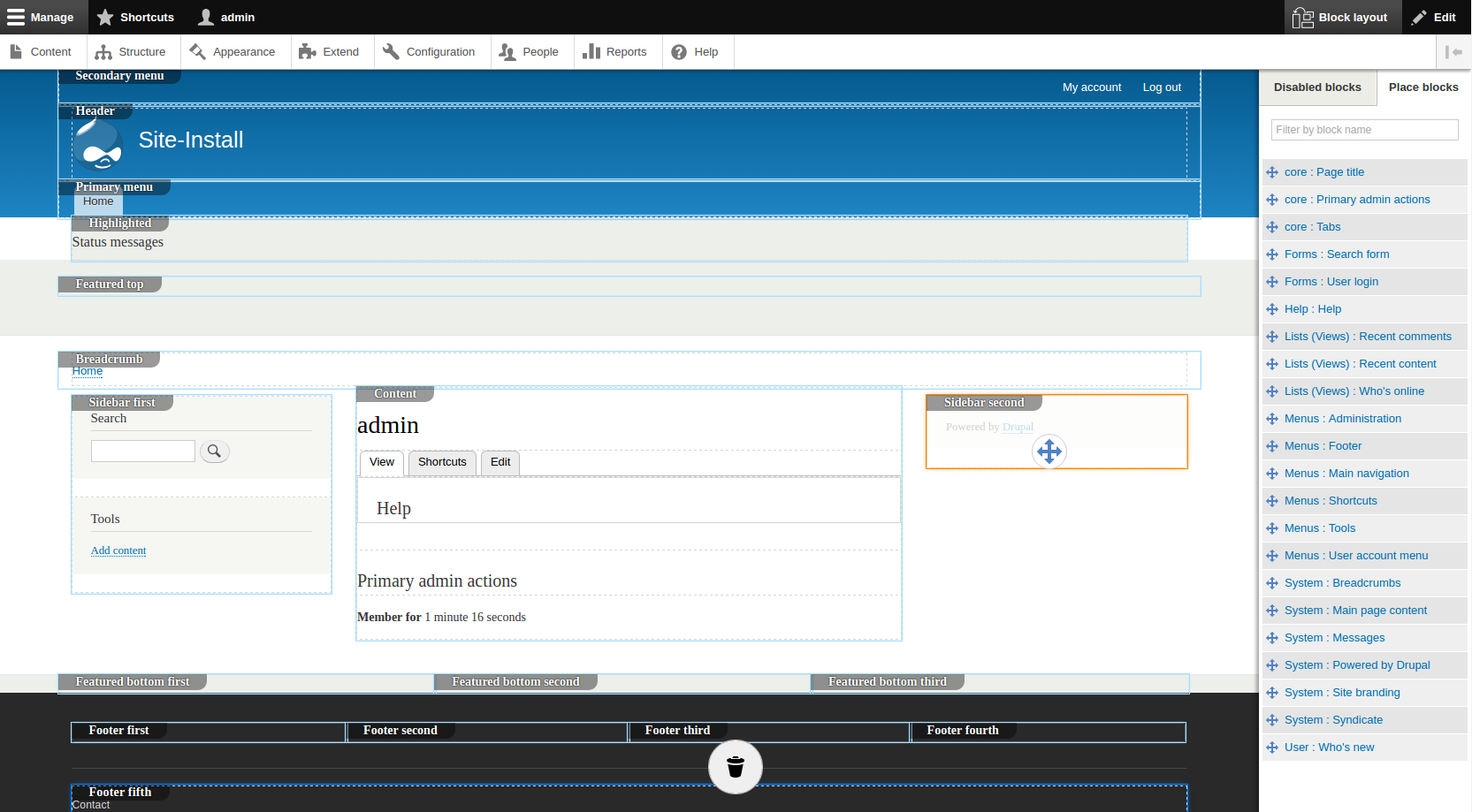
Mobile editor/app
 8.1
8.1
 0
0
🏆
Winner: WordPress
. Both WordPress and Drupal are powerful content management systems, but when it comes to mobile editing, WordPress takes the lead. WordPress offers a mobile editor app that allows users to manage their website on the go. You can create and edit posts, manage comments, schedule content, and analyze website traffic from your phone or tablet. While it offers convenience and basic functionality, it has some limitations compared to the web-based editor, including fewer advanced options, restricted code access, and limited design customization.
On the other hand, Drupal does not have a dedicated mobile editor app. Therefore, if mobile editing is a priority for you, WordPress would be a better choice.
Product testing options
Product Testing OptionsAssesses the options for trying out platform features before commitment.Score Components:
- Trial quality (40%): Extent and usefulness of the trial or free version.
- Feature accessibility (30%): How many features are available to test.
- Trial duration (20%): Length of the trial period.
- Ease of transition (10%): Smoothness of moving from trial to paid plans.
 8.1
8.1
 7.1
7.1
Overall Result
:
WordPress Wins
. WordPress scores 8.1 in product testing options, while Drupal scores 7.1. Both WordPress and Drupal are open-source content management systems, meaning they are free to use and modify. However, they do not offer trial versions or the possibility to test premium features.

|

|
|
|---|---|---|
|
Free Plan |
Yes (open source software) | Yes (open source software) |
|
Trial Duration |
No | No |
|
Testing Premium Features |
No | No |
Price
PriceLooks at the cost-effectiveness and value for money of each platform.Score Components:
- Plan value (40%): What each pricing tier offers.
- Transparency and clarity (30%): Clearness of pricing structures.
- Flexibility of plans (20%): Range of options to suit different budgets.
- Hidden costs (10%): Additional expenses not included in the plan.
 5.9
5.9
 5.7
5.7
Both WordPress and Drupal are free to use, but additional costs for hosting, domain, and website builder subscriptions apply.

|

|
|
|---|---|---|
|
$0+ |
Free Plan ($0/month): WordPress is open source software that is free. WordPress does not provide hosting services; so, it is necessary to purchase a domain, web hosting, and website builder subscriptions separately. While WordPress lacks built-in ecommerce, plugins like WooCommerce offer a solution. WordPress offers an extensive variety of templates and designs. WordPress lacks a built-in AI-assisted builder, but its open-source nature allows for an ecosystem of plugins and themes incorporating AI for website building. |
No offering at this amount. |
location. As a result in rare cases the prices displayed here can differ from the ones you see on their
websites.
Hosting quality
Hosting
qualityExamines the reliability and performance of the hosting solutions.Score Components:
- Uptime (40%): Consistency and reliability of website availability.
- Speed (30%): Loading times and performance.
- Bandwidth and storage (20%): Sufficiency of resources provided.
- Data centers (10%): Quality and distribution of hosting infrastructure.
 0
0
 0
0
🏆
Winner: Tie
Both WordPress and Drupal are open-source content management systems and do not directly provide hosting services. The hosting quality, including uptime, uptime guarantee, and data centers, depends on the hosting provider chosen by the user. Therefore, it’s not possible to compare the hosting quality of WordPress and Drupal directly.

|

|
|
|---|---|---|
|
Do they offer hosting? |
No |
No |
|
Data Centers: |
Depends on hosting provider |
Depends on hosting provider |
|
Type of hosting: |
Depends on hosting provider |
Depends on hosting provider |
|
Uptime: |
Depends on hosting provider |
Depends on hosting provider |
|
Uptime Guarantee: |
Depends on hosting provider |
Depends on hosting provider |
Website Speed Optimization
Website Speed OptimizationEvaluates optimization of website loading timesScore Components:
- PageSpeed Score (30%): Google’s score indicating performance optimization.
- Loading Time (30%): The average time until a website is fully interactive.
- Mobile Optimization (15%): Optimization effectiveness for mobile devices.
- Resource Optimization (15%): Optimizing images, scripts, and other heavy resources.
- CDN Usage (10%): Use of CDN to enhance speed across geolocations.
 6.5
6.5
 6.4
6.4
🏆 Winner: WordPress
Both WordPress and Drupal offer resources for website speed optimization, but WordPress provides more specific tools and strategies for improving Core Web Vitals (CWV), giving it a slight edge.

|

|
|
|---|---|---|
|
Focus |
Website speed optimization resources |
Speed optimization guides and tutorials |
|
Performance Tools |
Core Web Vitals, WP Rocket, Hummingbird |
Depends on users |
|
Key Strategies |
No specific strategy; dependent on user |
User can optimize almost all aspects |
|
Load Times |
Varies widely, dependent on optimization |
Varies depending on optimization |
|
Page Speed Scores Range |
Scores vary; influenced by apps, images |
Varies depending on website complexity |
|
Core Web Vitals Improvement |
Provides resources for CWV improvements |
Depends on users |
WordPress, an open-source content management system, does not have a specific strategy for website speed optimization. However, it offers numerous learning resources on how to optimize your website. WordPress provides valuable resources for enhancing your website’s Core Web Vitals (CWV), such as choosing a reliable host, optimizing images, minimizing plugins, using lazy loading, and employing a CDN. Tools like Core Web Vitals, WP Rocket, and Hummingbird are recommended, and AMP is suggested for mobile speed. Load times and PageSpeed scores vary widely, influenced by apps, images, and user optimization.
Drupal, another open-source content management system, offers numerous guides and tutorials on speed optimization. Users can optimize almost all aspects of their website. However, Core Web Vitals improvements depend on the users, and load times and PageSpeed scores vary depending on optimization and website complexity. Drupal does not provide specific tools for CWV improvements, which gives WordPress an edge in this comparison.
Get a head start on website creation with AI
Create a custom website tailored to your business needs 10X faster with 10Web AI Website Builder!
Plugins and integrations
Plugins and integrationsMeasures the range and effectiveness of additional plugins and integrations.Score Components:
- Variety of options (40%): Range of available add-ons.
- Integration smoothness (30%): Ease of integrating plugins into the site.
- Quality of plugins (20%): Functionality and reliability of the options.
- Custom integration capabilities (10%): Support for custom or third-party integrations.
 8.8
8.8
 8.6
8.6
🏆 Winner: WordPress.
With a score of 8.8, WordPress edges out Drupal (8.6) in terms of plugins and integrations. WordPress offers over 60,000 free plugins, while Drupal offers over 51,000 modules. Both platforms offer extensive customization options, but WordPress’s larger plugin library gives it a slight advantage.
However, Drupal’s modules are known for their flexibility and openness, allowing for a high level of customization and scalability. Both platforms have a wide range of top integrations that enhance their core capabilities, catering to various needs such as e-commerce, content management, SEO, and social media.
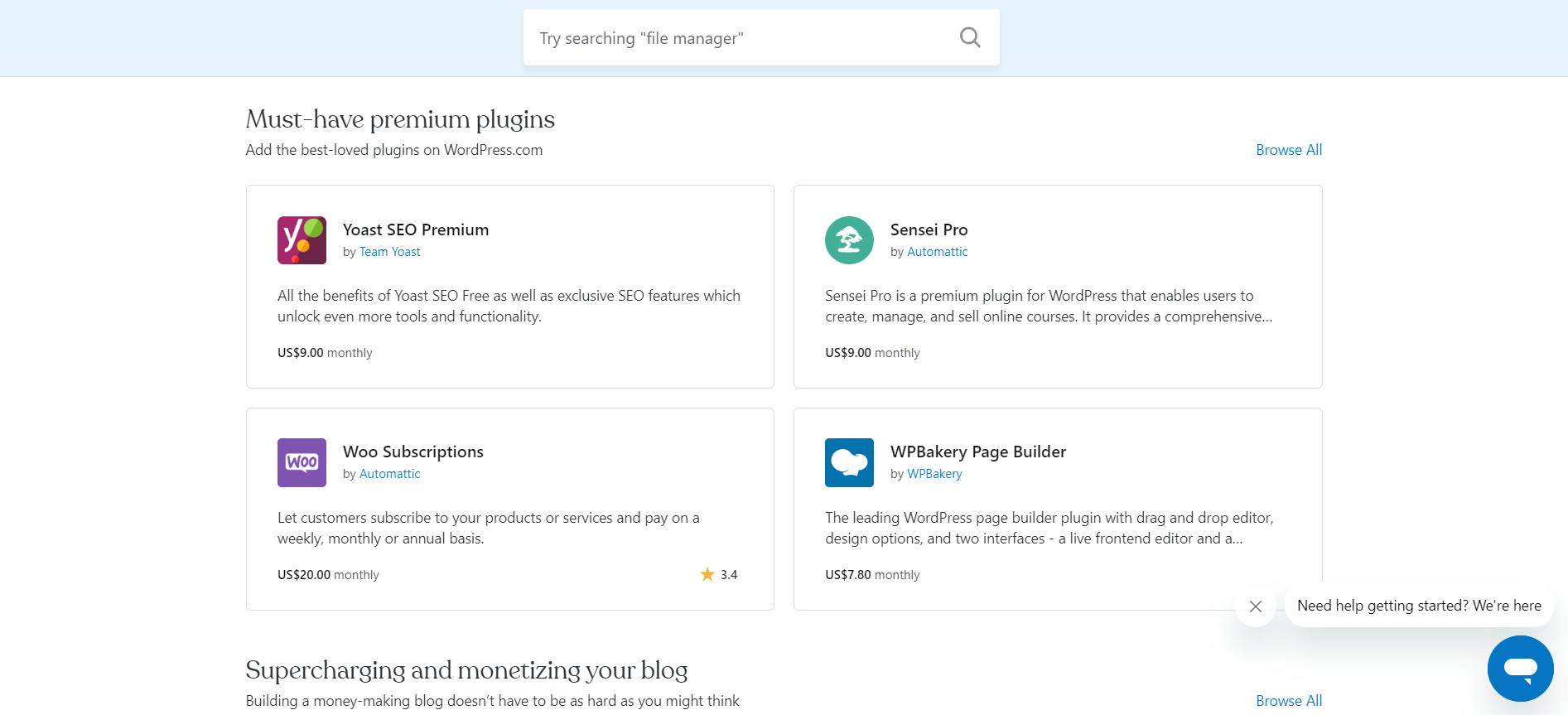
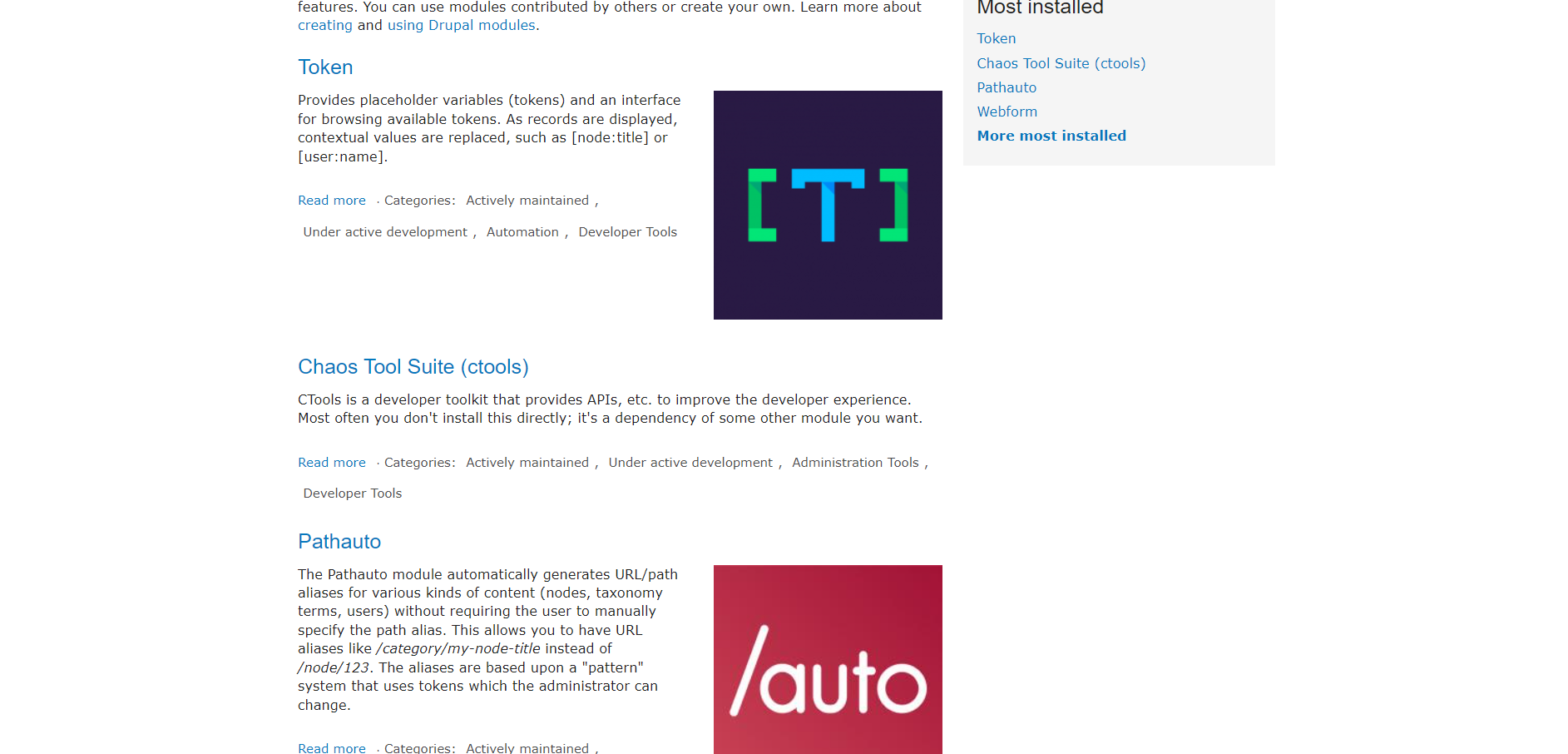
Marketing Features
Design FunctionalitiesRepresents how well each platform allows for creative design and customization of websites.Score Components:
- Template Variety (30%): Range and quality of design templates.
- Customization (30%): Flexibility and options for design alterations.
- User Interface (20%): Ease and intuitiveness of the design process.
- Responsiveness (10%): Adaptability to different devices and screen sizes.
- Innovation (10%): Unique design features and tools.
 8.0
8.0
 8.0
8.0
🏆
Overall Winner: Tie
. Both WordPress and Drupal offer a comprehensive set of marketing features, including SEO tools, email marketing, blogging, social media integration, analytics and reporting, and ads and promotions. However, the implementation of these features varies between the two platforms. WordPress relies heavily on plugins, while Drupal uses modules and has more built-in features.

|

|
|
|---|---|---|
|
SEO Tools |
|
|
|
Email Marketing |
|
|
|
Blogging |
|
|
|
Social Media Integration |
Plugins for direct linking, automatic posting, and social feeds display |
Yes, with modules for sharing, automation, and engagement |
|
Analytics and Reporting |
In-depth analysis via plugins like Google Analytics for WordPress |
Basic built-in features, and Google Analytics integrations through modules |
|
Ads and Promotions |
Support for Google Ads and ad management through various plugins |
Yes, but with third-party extensions |
Customer Support
Customer supportEvaluates the quality and availability of support options.Score Components:
- Response time (40%): Speed of support responses.
- Support quality (30%): Effectiveness and helpfulness of the support.
- Availability (20%): Range of support channels (phone, chat, email).
- Resource richness (10%): Quality of self-help and educational materials.
 5.0
5.0
 6.7
6.7
🏆 Winner: Drupal
. Comparing WordPress vs Drupal, Drupal takes the lead in this category with a customer support score of 6.7. Drupal offers a comprehensive range of support options, including community forums, extensive documentation, and professional 24/7 support services through providers like Drupal Connect. This ensures that users have access to the help they need, whether it’s basic community inquiries or professional maintenance and hosting needs.
WordPress, on the other hand, has a customer support score of 5.0. Due to its open-source nature, WordPress lacks direct customer support. Users must rely on community forums, the WordPress codex, hosting provider support, and plugin and theme support. While these resources can be helpful, they may not provide the same level of immediate assistance as Drupal’s professional support services.
Security
SecurityLooks at the platforms’ security measures and data protection.Score Components:
- Data protection (40%): Safeguards for user and customer data.
- SSL and encryption (30%): Implementation of secure connections.
- Compliance (20%): Adherence to industry security standards.
- Regular updates (10%): Frequency of security updates and patches.
 6.7
6.7
 8.3
8.3
🏆
Winner: Drupal
. Drupal’s security measures are more comprehensive and robust compared to WordPress. Drupal provides a wide range of security features, including regular updates, built-in mechanisms for preventing common web vulnerabilities, advanced security features like two-factor authentication, and extensive access control capabilities. Drupal also has a dedicated security team that continuously works on identifying and fixing vulnerabilities.
WordPress, on the other hand, provides numerous functionalities and resources to enhance website security effectively. Users can utilize multiple plugins to bolster security, such as those for site backups, monitoring, malware scanning, user activity tracking, permission control, and spam protection tools. However, the approach to private data storage and protection can vary depending on the hosting provider, which makes Drupal a more secure option.
AI Capabilities
AI capabilitiesMeasures the effectiveness of AI-driven features and tools.Score Components:
- Automation efficiency (40%): Impact of AI on streamlining processes.
- Personalization (30%): AI-driven customization for users or customers.
- AI-Assisted design (20%): Role of AI in website design and functionality.
- Data analysis (10%): Use of AI in interpreting user data and analytics.
 6.1
6.1
 7.5
7.5

|

|
|
|---|---|---|
|
AI-assisted Builder |
AI Site Builder and Zita plugins available |
|
|
AI Ecommerce Features |
AI plugins for marketing, personalization, and SEO |
AI for chatbots, content creation, and marketing automation |
|
AI Content Generation |
AI Engine and GetGenie plugins for content writing |
AI Connect module for content generation and SEO optimization |
|
Additional AI Features |
Various AI plugins for improved website performance |
AI for search enhancements, content personalization, and moderation |
🏆 Winner: Drupal
. With a score of 7.5, Drupal offers a more comprehensive range of AI functionalities, including chatbots, automated content generation, SEO optimization, and cognitive services. These features significantly enhance user engagement and satisfaction on Drupal-based platforms.
WordPress, scoring 6.1, relies heavily on third-party plugins for AI capabilities. While it offers a range of AI plugins for tasks such as content writing and SEO, it lacks a built-in AI builder and has fewer AI ecommerce features compared to Drupal.
User Management
User ManagementAssesses the platforms’ capabilities in managing user roles, permissions, and accessibility.Score Components:
- Role Customization (40%): Flexibility in creating and defining user roles and
permissions. - Ease of Management (30%): User interface and tools for managing users.
- Access Control (20%): Effectiveness of access control measures for different user
levels. - Scalability (10%): Ability to manage a growing number of users efficiently.
 8.8
8.8
 9.1
9.1
🏆 Winner: Drupal
. Both WordPress and Drupal offer robust user management systems, but Drupal’s flexibility and unlimited user capacity give it an edge.
- WordPress’s editing access depends on user roles and additional controls. User roles, ranging from Super Admin to Subscriber, dictate the level of permissions, while plugins and controls such as role management plugins and revision control offer further customization for specific editing rights and collaboration.
- Drupal’s flexible permission and role system allows for an unlimited number of users to manage and edit a website, only constrained by server capacity and practical management considerations. Administrators can create various roles, such as “Editor” or “Administrator”, each with customized permissions.
WordPress User Roles and Access Levels:
| Role | Description | Access Highlights |
|---|---|---|
| Super Admin | Manages the entire network in WordPress Multisite. | Network admin, manage sites, users, plugins, themes. |
| Administrator | Full access within a single site. | Manage plugins, themes, users, all posts/pages. |
| Editor | Manages and publishes content, including others’ posts. | Edit/publish all posts, manage comments, categories. |
| Author | Publishes and manages their own posts. | Write, edit, publish own posts, upload files. |
| Contributor | Writes and edits their own posts but cannot publish. | Write, edit own posts (no file uploads or publishing). |
Drupal User Roles and Access Levels:
| Role | Description | Access Highlights |
|---|---|---|
| Editor | Users responsible for content creation, editing, and publishing. | Can create, edit, delete, and publish content; can also manage comments. |
| Moderator | Users focused on site moderation, including comment and user management. | Can approve or delete comments, block users, and manage reported content. |
| Administrator | Users with full access to all administrative features of the site. | Can change site configuration, manage all content, users, permissions, and install modules/themes. |
Additional Features

|

|
|
|---|---|---|
|
SSL Certificate |
|
|
|
Custom Domain |
|
|
|
Free Custom Domain Included |
|
|
|
International Domains |
|
|
|
Mobile Responsive |
|
|
|
Page Speed |
|
|
|
Website Builder Mobile App |
|
|
|
Convert a Website To An App |
|
|
|
Website Analytics |
|
|
|
Multilingual Sites |
|
|
|
Multiple Users |
|
|
WordPress vs Drupal: User Feedback
WordPress receives praise for its user-friendliness, cost-effectiveness, extensive themes and plugins, customization options, and supportive community. However, users mention technical challenges, security concerns, a learning curve, and a lack of direct support. Overall, it remains a widely used and versatile platform, especially beneficial for startups and small businesses.
Users appreciate Drupal for its ease of use, security, and flexibility as an open-source CMS, highlighting its ability to scale and support a variety of websites and applications with modern technology tools. The community and documentation are frequently mentioned positives, providing ample support and resources. However, criticisms include a relative lack of plugins and themes compared to competitors like WordPress, the learning curve for customization without coding, and some challenges with installation and updates. The platform is praised for its robust content management capabilities, enabling users to manage content and user access efficiently. Overall, feedback underscores Drupal’s strength in creating secure, customizable, and scalable web solutions, despite some desires for more intuitive UI and easier setup.
The making of this blog
We followed a clear, step-by-step process to write and research this article.
WordPress vs Drupal: FAQ
Which is easier to use, WordPress or Drupal?
Can I build an ecommerce site with WordPress or Drupal?
Which platform offers better customization and flexibility?
How do WordPress and Drupal compare in terms of security?
Which platform is better for SEO?
Is there a difference in the cost of using WordPress vs. Drupal?









